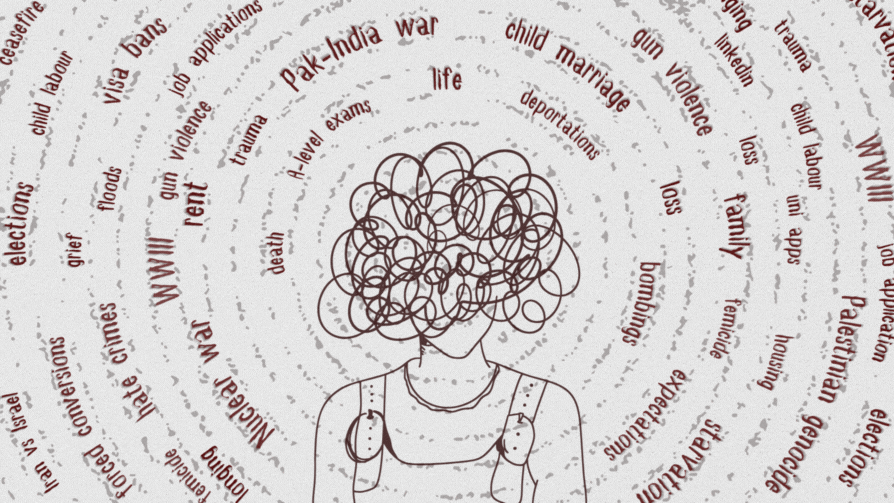5 classic Pakistani songs that send confusing messages about consent
Some of last year's big hits like Drake’s 'Hotline Bling' and 'Hold On (We’re going home)' got us wondering if we'll ever be able to break free of ‘good-girl’ ‘bad-girl’ stereotypes in pop culture.
Not too long ago Robin Thicke's 'Blurred Lines' caused controversy too as the song reinforced misconceptions about consent: lyrics like 'I know you want it' suggested that 'no' might actually mean 'yes.'
Just harmless fun? Not really. Played on repeat, these songs are internalised by us, seeping into our subconscious.
And what about Bollywood tunes and Pakistani songs? We went back to our old favourites to listen closely, and its turns out that many of our own tracks broadcast the troubling message that violating personal space is ok, and that consent is optional.
1) Babia or Bibi by Sajjad Ali
Before you fly into rage let me just say this: I think Sajjad Ali is a great singer, but that doesn’t mean his songs can’t be critiqued by a fan who learnt all his songs by heart and copied his hairdo too.
Listening to 'Babia' the other day, I realised that although the song was upbeat and made me want to dance along... why is this person not taking his beloved's will into account? The lyrics are:
Kisi k kehne me na ana
Main he tou hon tera deewana
Saray jahan ko hai batana O bibi O bibi
Teri marzi nahi chalni o
Meri gal kyun nahi sunti
The chorus is the perfect profile of an overbearing, slightly manipulative and very jealous lover. He wants to be the only one you love, which is ok, but then he says 'You have no choice in the matter' (Teri marzi nahi chalni o) which is definitely creepy, not cute.
Thankfully, Sajjad is past those times now and most of his songs appear to be about um, consensual relationships. Whew!
2) Main Na Manon Haar by Awaaz
Remember the song which was perfect for mehndis? The composition and video were perfect for a dance number back then, but even a song as memorable as 'Main Na Manon Haar' by Awaaz made me realise that ‘no means no’ isn't easily understood.
The lines go like this:
Main na manon haar
Sajna, dil na manay haar
Tou chahay jis raah pe jana main bhi jaon saath
Tou chahay gi haath churana
Main na choron haath
Dunya se ghabrana kya
Pyar karay hoye hoye waah waah
Dil mera pehchana kya
De kar haath churana kya
The lyrics very blatantly say that this lover (read: stalker) will follow his love wherever she goes and if she tries to let go of his hand, he’ll hold tight to it. Time to get that thinking cap on. It further says that once you have given someone your hand, i.e. consent to someone, you can’t decide to say no in the future.
The video also shows that good guy Haroon saved the day by almost rescuing the girl who is on her way to a forced marriage. Little does she realise that she's in a lose-lose situation anyway.
3) Rangein by Ali Zafar
Disclaimer: love the tune, love the video. But it contains a line which would make any woman put her guard up.
Rangeen hai tou rangon se bhi ziada
Shoq lagti ho reh k bhi sada
Le jayen ge tujh ko utha k
Tere bina lagay na mora jiya
I can't help but feel that the idea of 'taking a girl away' (Le jayen ge tujh ko utha k) here isn't the same things as 'sweeping her off her feet.' Guys, important note: abduction isn't the best way to win a woman's heart!
However Ali's later songs don't have a creep vibe in them and we are quite thankful for that.
4) Saali by Shehzad Roy:
It's absolutely impossible to forget this song because it creatively incorporated the word 'saali' which means sister-in-law... and a few other things.
Given that there are already too many lines about 'saalis' in our society with negative connotations like the disturbing one 'saali, adhi ghar wali', this song should've turned that concept on its head but it didn't. Instead, we're reminded of how the pursuer —er, lover — does not respect his beloved's personal space and sense of autonomy.
Saali tou maani nahi
Kabhi tou manay gi
Saali pehchaani nahi
Kabhi tou janay gi
Ban k anjaani karay manmaani
Aur ye manmaani hai teri nadaani
Okay, since when did manmaani (following your own heart) make a woman a fool? And second, if the said saali does not consent to your advances, let her be, stop following her around, jeez. Shahzad has sung many songs about the idea of unrequited love, and yes, we feel his pain, but this isn't going to help matters much. At least the singer is now sticking to social causes so hopefully there won't be any other man stalking someone's saali in the future.
5) Eik Baar Chalay Aao by Saleem Javed:
This one is by far the most interesting of them all. Sung by Mehdi Hasan earlier, this song has some lines from the original ghazal and the best part? It promotes the idea of personal space!
Although if some guy was to declare his feelings in the same fashion Saleem Javed did, girls might back away slowly but remember, two to three decades ago, this was the ultimate cool.
Eik baar chalay aao
Phir aa kay chalay jana
Phir tum ko bulaye tou
Tum shauq se mat ana
These lyrics convey what personal space is and do so without being overtly creepy. The courter starts off with requesting his love interest to meet him once, and if she doesn't feel comfortable, she can refuse to give him the time of the day next time and he'll accept her decision.
Admittedly, the latter half of the ghazal does talk about the lover swooning over him but that has nothing to do with him thinking ''she'll come around some day'' like saali nor does it say that ''I won't let go of your hand if you have held mine'' — take note, gentlemen.
Even today, I'd bob my head to these songs (guilty as charged!) if they're ever aired on TV or I hear them on the radio because we grew up listening and dancing to them. I am sure many were inspired by Main Na Manon Haar but did we ever consider that we were perpetrating a culture of such uncomfortable lyrics becoming the norm?
At face value, they might seem very harmless but with a little nuance, these lines tell the listeners that it is okay to stalk girls if you like them, it is acceptable to violate their personal space and if a girl says yes once, she can never take it back.










Comments